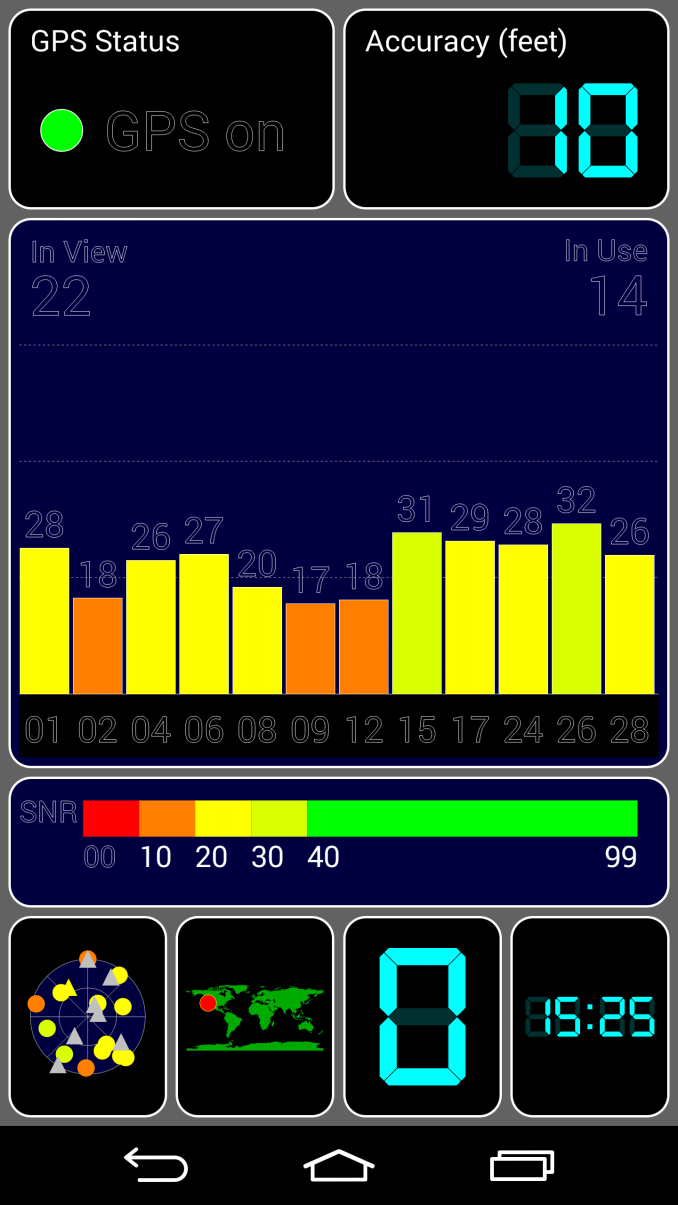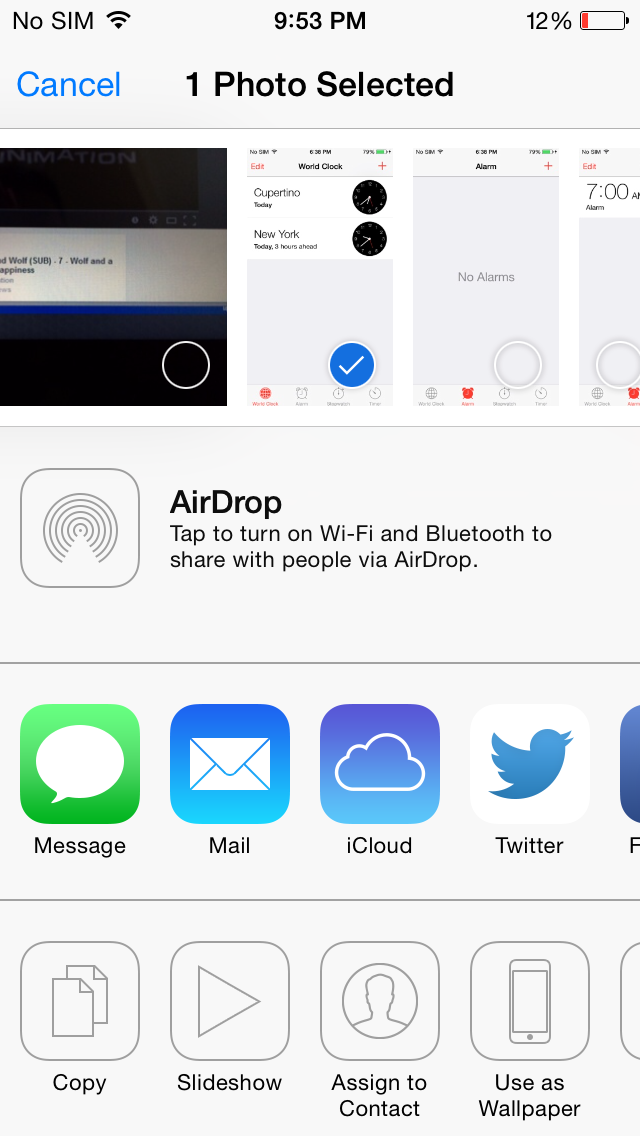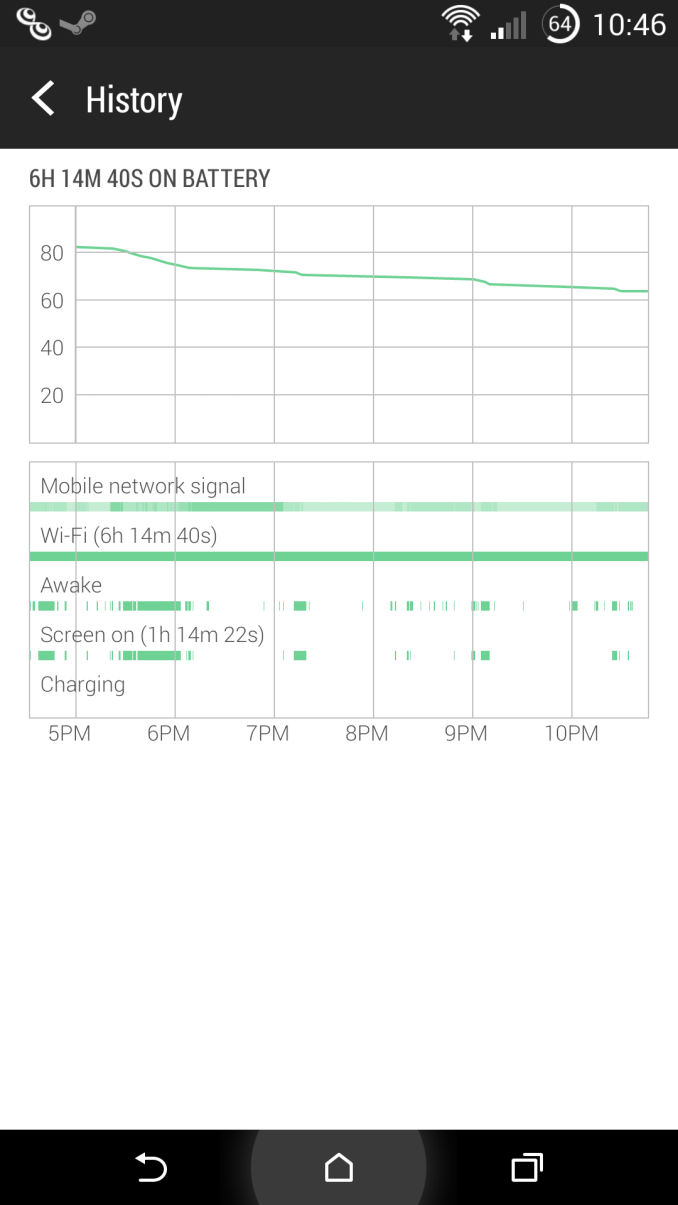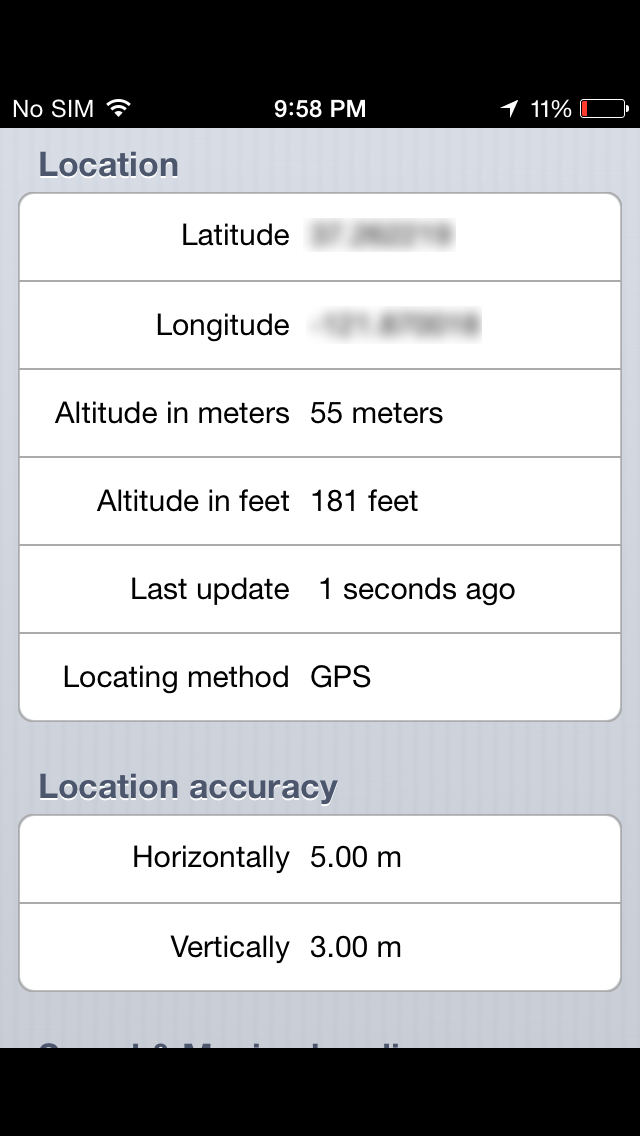A Month with the iPhone 5s: Impressions from an Android User
by Joshua Ho on August 24, 2014 7:00 AM ESTSoftware
From a purely functional perspective, there are some pain points involved in moving from Android 4.4 to iOS 7. While it’s been talked to death now, the lack of a system similar to intents on Android and the lack of customizable keyboards are definitely a bit on the frustrating side. For example, while on Android manually uploading screenshots, photos, and video to Dropbox is a relatively painless process, doing the same on iOS isn’t possible. While one of the first things I do on any Android smartphone is install SwiftKey, it’s not possible to do the same on iOS. This immediately causes my typing speed to drop, although in the case of iOS’ keyboard this is mostly due to the lack of punctuation in the letter page. However, these two immediate issues are about to be irrelevant with the release of iOS 8, so this is more of a temporary issue than a permanent one.
Although also temporary, for those that have become accustomed to the significant amount of custom control provided by camera apps from HTC and Samsung, the iOS camera application is comparatively barren. There's the ability to toggle HDR, flash, tap to focus/expose and lock focus/exposure. In effect, there's no real way to set manual controls. While the auto mode is pretty much as good as it gets, I find myself missing manual controls when it comes to taking macro photos and in other similarly extreme conditions.
There are a few other issues though. To someone that has almost solely used Android smartphones, the notification drawer has some odd behavior. It’s never really made sense to me why notifications can only be cleared by application. I definitely think a clear all notifications button would be a good addition for the future, but this is only a significant problem if a large number of notifications build up without getting cleared away. I'm also not sure what the value is to segregating "all" and "missed" notifications. Android definitely handles this better, although it probably makes more sense to those that have used iOS' notification system from the start.
Outside of these issues, there’s quite a lot to like. The vast majority of applications that I used had a consistent style that fit with iOS 7, with no strange scaling issues or unexpected behavior. This still tends to be a problem in Android, so it’s refreshing to have an app ecosystem that tends to keep up with the design guidelines set with each new iOS release. There’s also just about no stuttering or pausing in the experience. While Android L and ART should bring much better performance to Android smartphones, in iOS it seems that such performance issues haven’t really existed in the first place.
iOS and Android/Sense 6 battery stats
Of course, while there are some issues that could be fixed, there are others that are much more fundamental. One of these is direct access to the file system. While it’s quite convenient in Android to trawl through system files to learn about the underlying hardware and move around data using a file explorer, it makes sense to completely sandbox applications from each other to improve security. Another advantage of sandboxing applications is that orphan files are nonexistent, which is an issue on Android devices.
In addition to file system differences, it’s a bit frustrating to not have detailed battery life statistics when it comes to how much CPU time each application consumes, how long application wakes up the system while the screen is off, and similar details. However, it once again makes sense for Apple to do this. After all, iOS battery management is already quite stringent. In general, applications are strictly regulated and most cannot run in the background for any significant amount of time. On Android, it's possible for a single rogue application to ruin battery life, but this same system means that multitasking tends to be much faster and smoother.
If anything, this may be the real difference that matters when comparing iOS and Android. While Android and iOS are largely similar in features, there is a fundamental divide in the way the two OSes are designed. At its core, iOS is designed with average users in mind. As a result, there’s a strong emphasis on making things “just work” and hiding information that would simply confuse and frustrate people that don’t care about the underlying hardware and software. Android at its core is targeted at those that want to have the full PC experience on their phone, and as a result there’s much more information and low level functionality for those that want it. However, this can easily be frustrating and confusing for the end user. Of course, it’s fully possible for iOS to adopt features that would be targeted at advanced users, and Android can be changed to be more user friendly. If anything, this hypothetical has been the case for the past few years. Over time, Android has become a more friendly OS with the removal of the search and menu keys, going from the dark themes of 2.3 and 3.0 to the brighter, cleaner designs of today. Things like Google Maps have become considerably more simplistic, and even microSD slots had significant restrictions added to them in an attempt to simplify the user experience. Similarly, the fact that manual camera controls are even possible speaks to how Apple is adding more niche features.

GPS Info! on iOS and GPS Test on Android
However, the differences remain, and understanding this is as simple as looking at how equivalent features are implemented. For example, location services in iOS are binary in nature, and can only be turned on and off globally or for each application. In Android there’s noticeably more nuance. Location can be done only by on-device GPS, or by using WiFi/cell tower location, or by using both. In addition, it’s possible to view GPS data such as per-satellite SNR and number of satellites used and in view.
Final Words
At the end of the day, the iPhone 5s has aged quite well. While the hardware quality is a cut above, it’s more than just a matter of pure hardware. It’s clear to me that the user experience wouldn’t be nearly as good without Apple’s strong control over software. TouchID is quite possibly the best example of this, as there’s no need to wait for an official API to support fingerprint authentication for App Store purchases or other similar situations. While I felt a bit constrained by the limits in the operating system, the integration and overall quality of the experience outweighed these disadvantages. I’m not quite sure if either is better at this point, as while I definitely enjoy the amount of low-level information and customization available on Android, iOS has a much more polished and highly integrated experience.
However, in the long run it seems likely that they will converge towards largely similar feature sets. This doesn't mean that they'll be identical, as there's a distinct parallel in the Mac vs Windows debate. In Windows, adoption of new hardware features into the OS tended to be slower and not as well integrated as the OS vendor and multiple OEMs had to try and coordinate such a task. However, a major advantage of such a system was that backwards compatibity and flexibility was greater, even if it was more complicated for the end user. Similarly, Mac has tended to have new features at a faster pace and with better integration, such as high DPI displays. However, the result tends towards less control over low-level settings and less visibility into low-level information. The tight integration between hardware and software also means that it's harder to provide extensive backwards compatibility.
Of course, these are mostly broad strokes. It's not really possible to predict what the future holds, but even now we can see major differences. Google has allowed for custom OEM UIs on top of Android, and doesn't profit directly from the sale of Android OS. Similarly, the nature of smartphones dictates tight integration, so it's not really possible to upgrade the OS without a new BSP and major work on the part of the OEM to push an OTA. Apple has also managed to ensure that the app ecosystem of iOS is equal to or greater than any other mobile OS, something that was a major stumbling block with Mac OS in the early days of personal computing. While a great deal of maturation has occured in the smartphone market, there is still a long road ahead before the story can end.



_575px.PNG)
_575px.PNG)
_575px.PNG)










197 Comments
View All Comments
Spoony - Sunday, August 24, 2014 - link
I would conjecture that in some ways this is true of all of Apple's platforms. Apple hardware is top notch, so long as your goal is not gaming or some other specific performance usages. It has a few rough edges (MBA screen, iMac HDDs, MBP GPUs). I get frustrated often with the software. OS X has so many stupid problems (The Finder, the file system, weird panic bugs, stupid interface design). OS X could be solving problems for us in much better ways, Apple just doesn't seem to care about really pushing hard at what is possible. Not to say Windows and Linux don't also have annoying problems...Regarding the iPhone. I used to favour iOS because of the software and hardware. These days I feel like you can get very high quality hardware from LG and HTC (perhaps others, not Samsung). Quality to me counting fit and finish, materials, design, and specs. The latest versions of Android are also very usable.
Today I find myself still favouring iOS because of the nice selection of extremely high quality apps available. By and large they all cost money, but they are also all well supported and well designed. I cannot replace these apps on Android. The equivalents are poorly designed, clunky, slow, or just don't do what I want. If Android offered a great top-quality replacement for most apps I depend on with iOS, I would heavily consider spending the money to invest in a new ecosystem.
apertotes - Sunday, August 24, 2014 - link
I am forced to suffer an iPad on my work. There are many things I despise about iOS. The iPad in itself is almost great. The lack of expandable memory is a kick in the nuts (although Anandtech will never lower themselves to agree with the plebeians). But it is mostly fine. But iOS. God. So annoying.There are already many comments, but one thing I haven't seen is the lack of a "back" button/icon. I know that in Android it is somewhat erratic, but at least it is there. I hate it so much when I touch an itunes/safari icon while inside an app (to login to Facebook, or whatever) and for whatever reason the focus does not come back to the app, and there is no back button. So I need to go to the desktop to launch the app again or launch the multitask feature. I really hate it.
rkcth - Sunday, August 24, 2014 - link
Actually, you just double click the home button and the app will be the second image at the bottom. It shows an icon and screenshot of all apps opened in the order in which they were last used. It takes about 0.25s when you get used to it.steven75 - Sunday, August 24, 2014 - link
4 finger swipe. Problem solved!jkauff - Sunday, August 24, 2014 - link
As a long-time, fairly savvy Windows user who never liked Apple's "walled garden" ecosystem, I surprised myself by buying an iPhone. I started with the 5 and now have the 5S. At the time I bought it, it was by far the most elegant hardware design available. The size is perfect for me to carry it around in my shirt pocket. My biggest gripe is the email app, which is crippled and can't be replaced with a third-party app. Why the hell can't I select everything in my Inbox and delete it? Why can't I attach a file to a reply message? Absurd. All of the other shortcomings I've found, though (except for the keyboard) I've been able to solve with very capable apps that cost no more than $3 or were free. I can play MKV format movies with hardware acceleration using HDPlayer, and there are several apps that play my FLAC music files (I settled on Equalizer Pro because I can use it to compensate for the bass-heavy iOS audio). The lack of access to the file system used to drive me nuts, but the Dropbox app has solved most of my document problems. Battery life is very good if I control the display brightness. I'll look at Android again the next time I'm in the market for a phone, since the hardware and software have come a long way in the past two years, but for now I'm quite content with this lovely bit of hardware in my pocket.kevith - Sunday, August 24, 2014 - link
Apple won´t allow me, a 53 year old guy, to see a pair of tits, not even in a photo of a Rubens painting. I´l never even consider anything "i"steven75 - Sunday, August 24, 2014 - link
Apple doesn't filter your internet connection. Safari will show you as many noods as you want, even has a "private browsing" mode.Malih - Sunday, August 24, 2014 - link
I would expect to still be able to remember and maybe type the url or at least search keyword for what I wanted to explore on the browser, when I'm 53.It seems I could be wrong.
wurizen - Sunday, August 24, 2014 - link
Hey, seems like the android-ios was positive.I have a reverse experience. I've always been an iphone user from original iphone to iphone 3gs to iphone 4s. the original iphone was my first smartphone. And then for financial reasons, had to go android. so i got a no contract android phone, an LG Optimus L9 (LG-P769). It's running Android 4.1.2.
I've turned off/disabled every bloatware that I can with his phone. But, the experience is just jittery, stuttery, waitery (is that even a word?), jerkier, not seamless at all compared to my iphone experience. This experience that I am talking about are basic experience of opening a browser and switching to the 2-4 apps that I use most often. No big apps. Nothing complicated and the phone will just slow down. It's just an inferior experience.
And, the "pc" like tinkering ability of android vs. ios, I don't think has ever made me more "productive" other than discovering that android is a bit more flexible with file management and/or a different approach than ios. and, the only reason why i think most ppl would even "tinker" with android's file management is b/c one would like to move folders or files to an external sd card to free up space to the internal sdcard, which one needs to do quite often with android since it's flawed. by flawed, i mean, there is no way, for me, to use the external sdcard to install apps and/or can't make apps installed on the internal sdcard to store files/photos on the external sdcard, such as instagram, for example. so, once in a while, my phone would not be able to update apps b/c the internal sdcard is filled up. and this is when i dive into the file storage app and move thins around. one can't do this with an iphone. but, i don't think that is a minus. get it android?
also, 2007 is when iphone came out and it's 7 yrs later and android is still behind. phone quality wise and more so in the software dep't. but my experience is with 4.1.2. so it might be a bit different for others with later android version.
smartphone tech/software is either slow or apple is just fast and that "advance." what do you guys at anand think? you guys know this stuff more than me. slow android? slow industry? or is apple just that much better than the rest?
KoolAidMan1 - Sunday, August 24, 2014 - link
There is very little "productive" about tweaking in Android. What's productive is something with good software that does the job. Fiddling with customizations, especially cosmetic ones, is a waste of time.